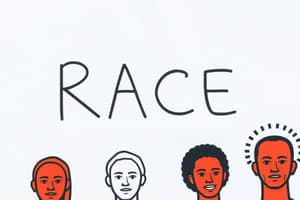Podcast
Questions and Answers
What is race?
What is race?
- A category based on religion
- A form of discrimination
- A biologically transmitted trait category (correct)
- A shared cultural heritage
What is ethnicity?
What is ethnicity?
A shared cultural heritage
Define minority.
Define minority.
Any category of people distinguished by physical or cultural difference that a society sets apart and subordinates.
What is prejudice?
What is prejudice?
Prejudices are considered prejudgments.
Prejudices are considered prejudgments.
What is a stereotype?
What is a stereotype?
What does the Social Distance Scale measure?
What does the Social Distance Scale measure?
Who is Emory Bogardus?
Who is Emory Bogardus?
What is racism?
What is racism?
What does scapegoat theory propose?
What does scapegoat theory propose?
Define scapegoat.
Define scapegoat.
What is authoritarian personality theory?
What is authoritarian personality theory?
What is culture theory?
What is culture theory?
What does the term 'culture of prejudice' refer to?
What does the term 'culture of prejudice' refer to?
What does conflict theory propose about prejudice?
What does conflict theory propose about prejudice?
Define discrimination.
Define discrimination.
What is institutional discrimination?
What is institutional discrimination?
What does pluralism refer to?
What does pluralism refer to?
List three reasons why the U.S. is not considered pluralistic.
List three reasons why the U.S. is not considered pluralistic.
Define segregation.
Define segregation.
What is assimilation?
What is assimilation?
Define hypersegregation.
Define hypersegregation.
What is miscegenation?
What is miscegenation?
Define genocide.
Define genocide.
Name some U.S. racial and ethnic groups.
Name some U.S. racial and ethnic groups.
Who are Native Americans?
Who are Native Americans?
What defines White Anglo-Saxon Protestants?
What defines White Anglo-Saxon Protestants?
What historical context shapes African Americans in the U.S.?
What historical context shapes African Americans in the U.S.?
What is the 'American Dilemma'?
What is the 'American Dilemma'?
How was the dilemma of African Americans resolved historically?
How was the dilemma of African Americans resolved historically?
What characterizes Asian Americans?
What characterizes Asian Americans?
What historical issues have affected Chinese Americans?
What historical issues have affected Chinese Americans?
Flashcards are hidden until you start studying
Study Notes
Key Concepts of Race and Ethnicity
- Race: A socially constructed category based on biologically transmitted traits deemed significant by society.
- Ethnicity: Involves shared cultural heritage, including traditions, language, and national origin.
- Minority: A group distinguished by physical or cultural differences that society subordinates.
Prejudice and Discrimination
- Prejudice: Rigid and unfair generalizations about entire categories of people, influenced by factors such as race and ethnicity.
- Stereotype: An exaggerated description applied to all individuals within a particular category, with significant negative impact on minorities.
- Discrimination: Refers to the unequal treatment of various groups, manifesting in actions that are positive, negative, subtle, or overt.
Theories Explaining Prejudice
- Scapegoat Theory: Suggests that frustration among disadvantaged groups leads to blaming others for their troubles.
- Authoritarian Personality Theory: Views extreme prejudice as a personality trait connected to conformity and a black-and-white moral worldview.
- Culture Theory: Posits that while extreme prejudice exists in some individuals, moderate prejudice can be found in everyone.
- Conflict Theory: Argues that prejudice serves as a tool for powerful individuals to maintain control over subordinate groups.
Social Structures and Distinctions
- Social Distance Scale: Measures how closely people are willing to interact with various social categories; shifts in acceptance have been observed over time.
- Institutional Discrimination: Bias ingrained in societal institutions, perpetuating inequalities.
- Pluralism: Ideally promotes equal social standing among diverse racial and ethnic groups, though the U.S. struggles with genuine pluralism.
Racial and Ethnic Dynamics in the U.S.
- Segregation: The enforced separation of racial and ethnic groups, leading to social and physical isolation, classified as either de jure (by law) or de facto (in practice).
- Assimilation: The process where minorities adopt the dominant culture, affecting their ethnicity but not their race.
- Hypersegregation: Characterized by limited contact with outside communities, reinforcing isolation.
Historical Context of Racial/Ethnic Groups
- Native Americans: Experienced centuries of conflict and genocide, reducing their population from millions in the 15th century to about 250,000 by 1990.
- White Anglo-Saxon Protestants: Predominantly English ancestry, historically dominant in American society without facing significant prejudice.
- African Americans: Subjected to slavery, with systemic denial of rights leading to the "American Dilemma" involving entrenched racial inequalities.
- Asian Americans: Noted for considerable cultural diversity, facing the "Model Minority" stereotype, which obscures the economic challenges within the group.
Specific Ethnic Group Experiences
- Chinese Americans: Immigration surged during the gold rush; faced severe discrimination leading to restrictive laws and social marginalization but gained upward mobility post-WWII, despite ongoing prejudice.
Studying That Suits You
Use AI to generate personalized quizzes and flashcards to suit your learning preferences.




